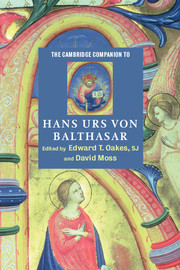Book contents
- Frontmatter
- 1 Introduction
- Part I Theological topics
- 2 Revelation
- 3 Christology
- 4 Balthasar and the Trinity
- 5 For the life of the world: Hans Urs von Balthasar on the Church as Eucharist
- 6 Balthasar and the figure of Mary
- 7 The saints
- 8 One sex or two? Balthasar’s theology of the sexes
- 9 Eschatology
- Part II The trilogy
- Part III Disciplines
- Part IV Contemporary encounters
- Select bibliography
- Index
2 - Revelation
from Part I - Theological topics
Published online by Cambridge University Press: 28 May 2006
- Frontmatter
- 1 Introduction
- Part I Theological topics
- 2 Revelation
- 3 Christology
- 4 Balthasar and the Trinity
- 5 For the life of the world: Hans Urs von Balthasar on the Church as Eucharist
- 6 Balthasar and the figure of Mary
- 7 The saints
- 8 One sex or two? Balthasar’s theology of the sexes
- 9 Eschatology
- Part II The trilogy
- Part III Disciplines
- Part IV Contemporary encounters
- Select bibliography
- Index
Summary
REASON, REVELATION, AND THE LIBERAL PROJECT
It must be admitted that 'revelation' as a theological topic is not without ambiguity. The very definition of revelation is in dispute, with critics pointing to its rather vague delineation as a separate topic of theological discourse well into the medieval period. Rather than getting bogged down in these sorts of questions, however, perhaps the best place to begin a treatment of Hans Urs von Balthasar's theology of revelation would be with his most basic assertion: in revelation we have a sovereign divine action pro nobis that makes God known to his creatures in a manner that they can apprehend (LA, 7-8). It is God who speaks in revelation and it is humanity who listens and responds. Even if it must be admitted that divine revelation makes use of worldly forms and words, these structures are 'taken up' into an essentially divine act and given a new context within a divinely constructed 'form' (Gestalt). For Balthasar, revelation is not a species of a much broader genus that can be loosely called 'religious manifestations' or 'divine epiphanies'. In Christ we have an utterly unique event without parallel that judges all human expectations rather than being judged and tamed by them. There are definite affinities with Barth here in Balthasar's insistence that revelation carries within itself its own theological warrant, its own self-authenticating, 'engracing' logic. Balthasar does not deny that there is a role for analogy, philosophy, and 'natural theology'. However, the issue is whether anthropology and/or cosmology will be allowed to govern christology, rather than the reverse. And on that issue he is consistently, even rigorously clear: Balthasar will reject any systematic approach that attempts to locate the significance of revelation within an overarching ideological scheme of some kind, especially when the attempt is made reductively to 'explain' revelation as an outcropping or even as an epiphenomenon of various anthropological capacities or cosmological processes.
- Type
- Chapter
- Information
- The Cambridge Companion to Hans Urs von Balthasar , pp. 11 - 23Publisher: Cambridge University PressPrint publication year: 2004
- 1
- Cited by

